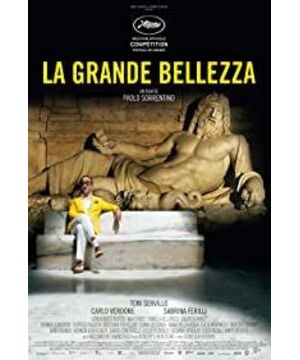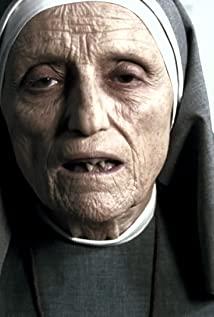1. The story of the protagonist jep
With the arrival of the first light of dawn, the beautiful nocturnal animals are scattered. The protagonist, Jep, walks home after a party for his 65th birthday. On a cool morning, mission school kids get ready for morning classes, dog walkers take their pets for a walk before the morning rush, and starlings start their first flight of the day. Jep, who has just turned 65 years old, slowly reveals his identity to us: a well-dressed bachelor, a playboy popular with women, a brilliant newspaper reporter, a famous author who has only published one book, A social master of high society.
jep's life is dominated by parties, he either goes to other people's parties or throws parties at his own house. jep knows everyone and knows all the gossip and secrets. Night after night, he was at parties, making new friends and greeting old ones. He smiled gracefully, danced coquettishly, and drank moderately. He goes to sleep in the morning and wakes up in the afternoon. His housework is well-organized by a maid. In addition to his busy entertainment, he also has a job as a reporter. He writes responsible reporting for his stern and cultivated readers.
Whether in life or at work, Jep has the acumen and courage to dismantle all disguise and power. We quickly learned how powerful he was in his interview with a female performance artist. The performance artist, who has a tattoo of a scythe on his privates, met with jep after a semiotic performance of flesh and stone. Jep ignored her vague artist rhetoric and tearful feminist appeals, and kept asking what the bullshit symbols were. The female artist who was unable to perform as planned and accused Jep of being a hostile, prejudiced and obnoxious person. And he happily enjoys his intellectual superiority and the thrill of attacking others with his IQ. The old fox Jep knows all too well the emptiness and boredom behind all this bullshit.
Not only to strangers, but also to old friends. When she was fed up with her old friend Stephanie, she published 11 humanistic novels of social value to herself, which well balanced a family with four children and a heavy career, and always kept the Marxist belief and sense of mission. Literature and education save the society, he has suffered a lot, and now he lives the life he deserves, but after bragging about a series of life achievements such as pursuing a meaningful life, he mercilessly exposed her lies And the truth behind success. He said that Stephanie's so-called belief and sense of mission were the events that happened in the university toilets that broke all restraints. A selfish mother who dumps all her children to the babysitter who only cares about her appearance, the whole city sees her husband and his lover in a dummy marriage, Stephanie is a woman who uses a mouth full of lies to cover up her vulnerability with embarrassed woman. Before giving his speech to dismantle the mask, jep said that his only advantage is to be a gentleman, but a man with a real gentleman would never say these words under any circumstances. Like Stephanie who left the room angrily, Jep is also using lies to create a false self-image in front of people.
These people in Jep's eyes, like himself, have wasted their lives and are on the verge of despair. He said that instead of attacking each other, we should look after each other. Jep, just an aging bastard, and aging has quieted him down and started to have some kindness. The young jep came to Rome with a classical ideal of a European intellectual, which was the ideal that Flaubert and Proust also had: going into and out of various salons (the salons of the past, the parties of today)) , to become a member of the upper class (climbing to power is one of the inherent nature of intellectuals). Unlike the self-knowledge of the first two, Jep's ambition is not only to squeeze into the upper class, but also to become the king of the upper class and have the power to defeat others. He said he succeeded. His path to success was clearly not paved by virtue.
We don't know much about the successful man's past, and his only setback in the film seems to be his first love. After learning of her death, the successful man began to search for his memory, he wanted to know that this gave him his first taste of floral lips and revealed to him the most beautiful things, deeply imprinted in his memory Why didn't the beautiful girl in here choose him but marry someone else.
Women love jep. The new rich woman who doesn't need a job at the party takes Jep back to her mansion in Piazza Livorna. This woman, who keeps posting selfies every day in order to know herself better, admits with inferiority that she is not smart enough to make Jep happy. Jep really wasn't having enough fun, and a woman who kept taking pictures of herself and seeing those adored photos as the biggest meaning of her life didn't deserve his head. In the past, Jep would still respect the rules of the game in the upper class and play tricks of hypocrisy, but after his 65th birthday, he would never waste a minute on things he didn't like. He left without saying goodbye.
He was even more attracted to Ramona, a 42-year-old stripper who danced in her father's nightclub. Jep is quickly drawn to Ramona, seemingly not by her body but by her mind. The two began to sympathize with each other in the denial.
Ramona: Are you looking for a woman, we have Polish girls here. Jep: I'm not looking for a woman, who is looking for a woman, I'm here to find your dad.
Jep: Your dad asked me to persuade you to marry.
Ramona: I don't marry.
jep: The family is beautiful.
Ramona: But I have nothing to do with beauty.
Jep was silent, Ramona asked him what was wrong, and he said, I feel like I'm getting old. Ramona said: You are indeed not young.
Ramona's words were as naked and frank as her body, without any falsehood. She seems to insist on being a sophisticated stripper in a world that is no longer refined. No one could understand her insistence. Her father said that she was always short of money. Jep asked her where you spent all your money. She said I might tell you later.
Jep took Ramona on a night tour of the ancient palaces of Rome. Close to the common man, the terrifyingly beautiful Rome of yesteryear reveals its true colors to Jep and Ramona. The ghostly duchess playing cards in the dim light made everything even more realistic. Modern Rome has plummeted to its demise, and behind those thick gated gates, ancient Rome was silent by candlelight with all its great secrets. The tall and straight Roman ancient pine with strong lines vigorously supports the dark green pine branches on the top. Day and night, witness the sunset, the moon rises, the stars dwindle, and the birds fly by. The most beautiful things never die.
Shortly after, Ramona died.
The movie doesn't give more specific information about Ramona's death, but it's likely that she died of breast cancer. She spends all her money to keep her breasts. Most ordinary women choose to cut off their breasts to save their lives, but as a stripper, it is impossible to give up. Breasts for Ramona are not just a matter of simple, or complex, organs or status symbols, but a matter of pure life. Also because she knew that she could not keep it after all, and knew that her time was short, she refused to say goodbye to the stage. She tried her best to leave more traces of her figure in this world with a beautiful posture. She and Jep are so similar, both know and accept their destiny, and they are calm, tender, dying, and beautiful because of it.
After Ramona's death, others gradually left, and the story gradually came to an end. The mother of the second generation of troubled rich donated all her property after her son's death and went to Africa as a charitable volunteer. With the dream of becoming a great dramatist, an old friend who has been fighting in Rome for 40 years bid farewell to Rome and decided to return home after receiving the only applause in his life. Friends gradually left, some gave up their lives, some gave up their wealth, and some gave up their dreams. But Jep's party goes on. The party was still the same people, those things, the addicts, the threesomes, the ladies and the faces. Guests who are intoxicated with dancing form a small train that will not go anywhere. Jep was a little drunk, and he confided to his maid: why did I never write a second book, you look at these animals, this is my life, nothing good. Jep always examines himself in a measured way, with a bit of self-knowledge sober, he sees himself clearly, but does not forget to express his deeper disgust for his own kind.
When the little friends thought that their favorite thing was a woman's body, Jep said that the favorite thing in his life was the smell of the old man's room. Jep is a man of early age, finally reaching 65, and what was an anachronistic attachment to a young man now seems fitting. Jep went to visit a photo exhibition. On the dense photo wall, the artist collaged each day of his growth into a time installation. jep scans the thousands of pictures on the wall. They exhibit irreversible aging. Life is magical, cursed, full, wasteful, crowded, empty, huge, and boring. Jep under the time device can't help moving.
The only solutions to existing problems are circus and religion. Fellini has been showing off to the world in his films these two traditional antidote to the Romans. Jep witnesses the disappearance of giraffes in the ruins of the Roman Emperor's Great Baths. Although the magician told him it was just a trick, nothing would really go away. But Jep is temporarily relieved by this miraculous trick. The huge giraffe suddenly disappeared into the dark night, and its life was hidden under various blind methods. Nothing really disappears, that beautiful behemoth exists somewhere, just temporarily, and we can't see it.
The horrific-looking Sister Maria and her slick spokespeople almost make one fear they are a pair of ruthless religious liars. Until Jep was surprised to find that Sister Mary, who was sitting on the balcony in the morning light, was surrounded by a group of storks on their way, and a large group of storks were scattered on his large balcony facing the Colosseum. The nun asked Jep why he didn't write another book. "I was looking for unparalleled beauty, but I didn't find it," he replied. The nun turned her head to give Jep an important revelation, then she smiled and closed her eyes, exhaling a powerful breath, and the flock began their journey again.
At the end of the film, Sister Maria uses her hands, knees and head to support herself up the holy steps of St. John's Cathedral. The nun, who says she is married to poverty and eats only 40 grams of root food a day, pushes her body to the limit and practices her religion with incredible will and strength. At this moment, Jep also came to the island where he met his first love. In the light of the lighthouse, the past reappeared, and he finally found the "best beauty" he was looking for.
Throughout the film, the task of the audience is to discover and understand what kind of person Jep is, and the task of the protagonist Jep is to solve the problem of how he failed and whether he can write a second book. After all, he was someone destined to be sensitive and destined to be a writer. He had to do what was meant to be done. The film revolves around Jep, a character in existential crisis haunted by his love of aging and death, whose paradox is that death ends life, in contrast to the colorful, worldly, The frivolous life is in stark contrast. The end of the film is a bad one, as the director asks Jep to make an unconvincing confession that he has finally overcome his existential crisis. Life has been shaped by disillusionment and failure, and by the end, the protagonist suddenly makes up for it with an aesthetic/moral epiphany, both fake and vulgar. The director has the ambition to open up a complex philosophical topic in his film, but is incapable of bringing the discussion to a suitable node to temporarily suspend the discussion (in fact he is giving a self-righteous answer to an unanswered philosophical question).
Second, the story of Rome
The salute, the monument to the hero, the statue of the general who resisted foreign aggression. The history of a unified nation-state moving toward independence, prosperity, and power is solidified into landscapes and rituals for ordinary tourists to watch. These unforgettable glories are part of the beginning of today's Italy as a modern nation. What attracts tourists more, however, is not this more recent history, but the more ancient history of the Roman Empire. The first scene of the film opens slowly in Janiculum, a hilly plateau outside the city of Rome, best known for its 17th-century marble fountain Fontana dell'Acqua Paola and its large platform. From this platform, you can overlook the panoramic view of the city of Rome. While the sudden death of the Japanese tourist after a full view of Rome was full of drama, the dramatic death seemed fitting on the beautiful platform, amid the solemn chants: Rome – Eternity The city has the beauty that captures the soul.
The first scene of the film comes from the outsider's point of view. Travelers give Rome too much praise, and every tourist may sigh with emotion. Those lucky people who were born in this city, how happy their lives should be accompanied by beautiful scenery. . The second scene of the film pulls the audience into the insider - the real Romans. They seem to be happier than outsiders imagined: in the music and wine, people in costumes, men and women, young and old, tall, short, fat and thin, are all intoxicated by dancing, these beautiful people with beautiful Rome, they Enjoy life to the fullest. Enjoy, yes, that's the vibe of the Berlusconi era. The one who got rich from real estate, media and football teams, likes to dye his hair black and shiny, fills every ditch on his face with Botox, is keen on throwing naked parties, has close ties to the Mafia, buys votes, hires prostitutes, evades taxes, Berlusconi, who is full of gibberish in public, has served as Italian Prime Minister four times before and after. He was the longest-serving Italian prime minister after World War II. Such a person has been repeatedly elected and has been in power for the longest time. Perhaps, as Putin said, it is the happiness of Italians to have him as prime minister.
In this way, the film quickly locates itself in the pedigree of Italian political cinema with two mutually contrasting scenes. The difference is that the political expression of the film is no longer as radical and straightforward as it was in the 1970s, but turned into powerless mockery and satire floating in the beautiful city of Rome. Jep, the protagonist who spreads these taunts, slowly appears in the dancing crowd, and he will lead us to visit the real Rome.
life in high society
When Viola asks Jep to talk to her son, Jep persuades her to accept the fact that he has such a son. Viola's son is a rich second generation who takes Proust as his spiritual idol. Compared with the more active lifestyle of most rich second generation, this rich second generation has a stronger cultural and spiritual pursuit. . Like his idol Proust, he relied heavily on his close relationship with his mother. But Proust and his mother's bedtime kisses and madeleines were no longer enough to satisfy the wealthy but lonely 21st-century young man living in a splendid mansion, and he gave her mother a more direct and naked Overwhelmed ways to build intimacy. Great wealth could not lessen the unspeakable pain that family ties had inflicted on this upper-class woman.
independent woman
Night in Rome belongs to nocturnal animals like jep. The male (and the director is also male) instinct keeps his eyes on women. A veiled Mu woman in the restaurant sat quietly beside her devouring husband. In the luxury car passing by the street, the woman with a dull expression slumped in the seat as if she had taken medicine. A delicate woman in cool clothes walks with her big dog pet on the streets of Rome in the middle of the night. The old but still elegant and beautiful former superstar Mrs. Raldan gave Jep a knowing smile and disappeared on the street corner. There are all kinds of incredible, happy, or happy women in this city.
New Age Faith
The friendship price is 700 euros, and the full price is 1,200 euros, which is the price of one injection of Botox. The collective ceremony of botulinum toxin injection held like a Roman secret is a straightforward satire on Berlusconi. Under the beauty trend led by the Prime Minister, everyone wears a young and tender mask to play themselves. Romans don't go to church anymore, and the religious sentiments that have been accumulated for thousands of years are now transformed into worshiping themselves in the mirror day and night. God, this old guy died long ago, and now is the best time, beautiful me, beautiful friends, beautiful city, beautiful people, except for the pursuit of beauty, to show beauty, life has no other meaning.
interesting contemporary art
Only the kind Ramona could see the tears in the eyes of the little girl who was splashing paint in anger. The little girl's parents force their child to display her art in front of potential employers, and the little girl resists with yelling and beating. But only a keen Jep could see the fake, unwilling conspiracy of shameless contemporary art and vulgar commercialism. He scoffed at Ramona's sympathy: the kid knew he was a cash cow. After smashing all the paint buckets, the little girl calmly polishes her art, which is just the most hysterical or grotesque expression of her inflated self. The seemingly innocent and rebellious little girl has long been disciplined by commercialism. Everything is for sale.
social above all else
Jep, 65, brought Ramona, 42, to the funeral of Fu Er Dai. He taught Ramona the social rules of high society. Funerals are the best social occasion for high society, and no one will pass up the opportunity to attend a funeral. At a funeral a person must wear the most exquisite dress, observe etiquette, behave appropriately, perform grief appropriately, and not only must not overshadow relatives but also win attention. Keep a low profile but make sure you are seen by all, and send an authoritative message to the family in your condolences. The lovely Ramona was like a primary school student, sitting obediently in her seat and watching her teacher's pretentious performance. We see on her face her reaction to every gesture of Jep: anxiety, embarrassment, disgust, convincing, bewilderment, shock. That is the instinctive reaction of a real human being to an alienated human being.
greedy monk
The cardinal, who is keen to talk about his delicious recipes, makes no secret of the gluttony nature of religious people. During their tedious life as monks, all they could think about was how to cook poor rabbits and sheep. J ep wanted to discuss the issue of the soul with him, but he was not at all interested. jep doesn't really want to talk about souls either, his only interest in the unlikable cardinal comes from the fact that he is said to be a very successful exorcist, jep is just curious if there really is a devil . He couldn't help asking this question sincerely even after ruthlessly digging at the cardinal. Isn't this the case with modern people? No one believes in God, but is curious about the real existence of the devil. The cardinal left with a livid face. The Vatican has always represented power rather than religion. There are only a bunch of useless parasites who only know how to eat. They jump up and down to make friends with dignitaries from various countries and enjoy the vanity and wealth of the world. If they are still a little useful to modern life, I hope they will do their job as the Religious Heritage Tourism Administration.
Aristocrats who have fallen to the bottom
The Duke and Duchess of Colonna of Reggio, hired to pretend to be Sister Maria's old acquaintances, the Duke and Duchess of Orsini, attend a dinner hosted by Jep for Sister Maria. The Duke and Duchess' entry fee is 250 euros per person, plus taxi fares. The Colonna family is the oldest and distinguished aristocratic family in Italy. The family history can be traced back to the 12th century. In its history, a pope, several cardinals and many political leaders have been born. The magnificent Roman Colonna Palace is the residence of the Colonna family for eight centuries, and the descendants of the family have always lived there. The descendants of the Colonna family need money and there are ways to make money. The film "Roman Holiday" once rented the Colonna Palace to film the tearful farewell of Hepburn and Parker. People from the Colonna family do often appear in social situations with their Duke/Prince/Princess titles (like the current Prince Harry and his wife). Everyone knows that their attendance is paid for, and while the social occasions they attend are sometimes surprisingly low-level, the 250 yuan per night quoted in the film is too shabby. And to pretend to be a feud of his own family. It's hard to believe that the people of this family have suffered to this point in order to live. Whether it's exaggeration or fiction or whatever, the duchess in the film return to their palace after a humiliating night. Instead of following her husband back to their basement, the duchess went upstairs to the room where she was born, where she put a coin into the slot machine, stood in front of the crib where she was born, and listened to her own recordings for tourists on headphones. The voice is telling the story of his family. The psychological compensation she was seeking also seemed to echo the melancholy of the ancient Rome that had passed away.
noble mafia
Jep thinks highly of himself, he considers himself the king of high society. And his mysterious neighbor, a taciturn, serious and noble Mafia wanted man, thinks more of himself than Jep: "I'm the only one who works hard to move the city forward while you and your friends are having fun. People. By the way, the old Ka's you are talking about are not the most advanced tailors in Rome, their fabrics are defective, and now the best tailors in Rome are the old Lei's." The resentful doer told Jep before his arrest. Vent out your dissatisfaction and borrow the details of a senior tailor to show your higher taste and sense of superiority in life. It was a seemingly ironic theatrical arrangement, but it was the truth of the Berlusconi era. The happy, beautiful, and wealthy Romans entrusted their repulsive politics to the prime minister of their choice four times. "Someone has to do the dirty work" is a famous Mafia saying. Berlusconi is said to have murmured to himself in front of the protesters in front of the presidential palace when he handed in his resignation: This is not fair, it makes me sad.
Stranded Costa Concorde
Near the end of the film, jep stands on a high rock and looks down at the Costa Concordia cruise ship, which is half immersed in the sea. On January 13, 2012, the cruise ship Costa Concorde set sail from the port of Civitavecchia near Rome, and soon hit a reef in an accident, killing more than 30 people in the accident. The captain was sentenced to 16 years in prison and a fine for manslaughter and abandonment of the ship. The accident came two months after Berlusconi announced his resignation, and the sinking of the ship by an incompetent captain was seen as an ominous sign that Italy was also slowly sinking. But more than a harbinger, Italy's decline had already begun slowly and relentlessly.
"The Beautiful City" not only tells the story of Jep alone, it tells the story of a city. The protagonist, Jep, naturally wonders in his own anxiety whether his failure to find unparalleled beauty is his own fault or part of Italian society as a whole (others). According to the logic of humanism, all problems necessarily contain human weaknesses, from themselves to others, and the ills of society as a whole. Rome was to blame for causing Jep's unease.
But jep blames Rome now, not Rome in the past. In the film, Jep reminisces about the past everywhere, showing his respect and admiration for the architecture, works of art and historical memory of ancient Rome from time to time. Old, old things are so beautiful. New things are always empty and unbearable. Although jep's contemporary high-society life also gives an impression of elegance, once he starts to compare the old and the new, he will see the contrast from the sublime to the rough, from the serious to the absurd, from the ethical to the sinful. Rome is a beautiful corpse, and everything that lives here is abominable, and only old age and death can perpetuate beauty. The beauty of Rome is constantly mixed with Jep's anxiety about reality. Because he realizes that the one he loves must be saved by death, but this salvation is also the end.
3. The structure of the story
The whole film is the protagonist's repeated questioning of "who am I". Using the unanswered metaphysical question of "Who am I" as the theme of the film, for ordinary audiences, this is almost destined to be an ugly film (the ugly here includes both technical viewing difficulties and unprovoked problems). sensually pleasurable regrets) films. Ordinary people usually don’t get too caught up in exploring the question of “who am I”, and what’s worse is that the protagonist chosen by the film lives at the top of the contemporary social pyramid, and the protagonist’s question of “who am I” is difficult to understand in a broader sense. The "Who Am I" question on behalf of the audience.
The answer to "Who am I" can only be answered through "My relationship to others." So the presentation of the protagonist's relationship with many others constitutes the skeletal structure of this plotless film. Luckily, this skeletal structure works pretty well, and makes this movie, which tends to be ugly, look great.
The entire film is a self-reflective, non-linear progression. The protagonist's memories of the past, reflections on old age, the influence of others, and religious enlightenment are intertwined in a long journey of reflection. A series of scenes, faces, feelings and impressions, memories and dreams come and go. New characters continue to appear in the film, and even towards the end, a group of people such as Cardinal and Sister Maria appear. Life is cut into pieces, piece by piece, easily overlooked. There is simply no way to form a cohesive whole. But Sorrentino succeeds in giving the film a sense of unity. It is this overall sense that makes it difficult for the audience to give up watching the film halfway through.
Every scene in the film is carefully constructed to present a certain aspect of society, or a certain look and feel of jep. However, each scene is not logically strongly related to the next scene. If the audience pauses in a certain scene, they usually do not know where the next scene will go. Surrounded by fragments without causal traction, the fragments are isolated from each other, but all the scenes have a coherent effect as a whole. The director uses superb editing and extraordinary music mobilization, and all the image fragments are drawn together like magic. The audience is overwhelmed with information, but is united by a subtle emotion mobilized by the director. This subtle emotion is something that everyone has experienced more or less: mediocrity, hypocrisy, depressing life, lack of meaning, questioning about life, melancholy brought about by emptiness, futile human beings, unspeakable nothingness .
While picking on a subject that could easily be messed up, the film manages to maintain graceful restraint, complemented by the witty humor and poignant satire that intellectuals love. The richness of the film and the complexity of its signifiers constitute a poetic mural of contemporary society and politics. In this mural, the predicament of the individual and the ills of society are woven together, the past and present are juxtaposed, and the two different aesthetic orders of life and death resonate at the same time.
The film's success also benefits from breathtaking camera movement. The camera, always in motion, strokes the stone pavements, marble sculptures and fountains, ancient buildings of the Roman city through unusual distances and angles. The camera takes the viewer into the ancient palace that we have always longed to enter, to admire the treasures that are closed to tourists: statues, paintings, tapestries and countless other glorious treasures.
The costumes for the film are also exciting. In the scene of the night tour of the palace, Ramona first wore a cheap, flesh-colored bodysuit that the noble ladies of the upper class regarded as a dirty woman. In fact, there was nothing more suitable for Ramona than this dress, she was poised in this dress that wrapped her body as soft as skin, and a pair of pointed gold dancing shoes that matched the gold thread on the dress. of attending high society parties. She is Ramona who is proud of her body and profession, a naive, honest and beautiful stripper. As Jep dragged her away from the party and infiltrated the secret palace, Ramona donned a long, deep royal blue cape over a gleaming bodysuit. The front of the cloak was slightly open, so Ramona could show her golden leather shoes and glittering legs from time to time as she walked. This dress looks comfortable, warm, and elegant. The lovely Ramona, like a princess, shuttles through the mysterious palace. This is the best gift jep can give her before she dies.
The film presents the audience with the beautiful Rome and the beautiful life living there in the most beautiful way. This is a successful film that explores what beauty is with a beautiful image. Perhaps for the director, beauty must also contain completeness, the narrative must have a period, and he must give an answer at the end of this exploratory journey. Although the epiphany at the end of the film is difficult to convince, it is at least the director's own conclusion. The monologue goes like this:
"It's always like that, death takes everything, but life once came.
Life is hidden in nonsense, settled in chatter and noise.
Silence and emotion, passion and fear.
The ever-fading beauty
And the poor, filthy, miserable human beings.
All of this is overshadowed by the embarrassment of this world.
People are still talking nonsense,
The other side of the world is the other side of the world
I don't care about the other side of the world.
So let this novel begin. At the end of the day, it's just a trick. "
Although it is said in twists and turns, I think the main idea of this passage is: beauty is life, life is beauty, and beauty and life are the journey from blooming to Tumi. Life is like a conjuration sometimes, no matter how fancy it is, in essence, nothing really disappears, nothing is beyond life. A writer ignores the noise and intrigues that cover life, gets to the root, and begins to write. (Who doesn't know... Although it's meaningless nonsense, such an ending allows the director's beauty to be completed after all.)
View more about The Great Beauty reviews











